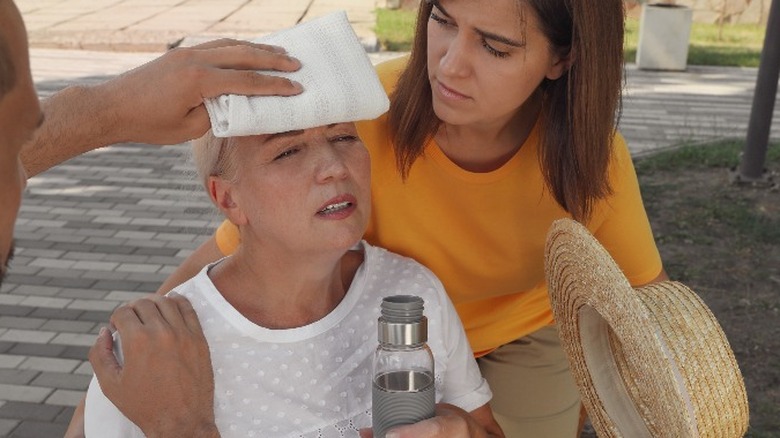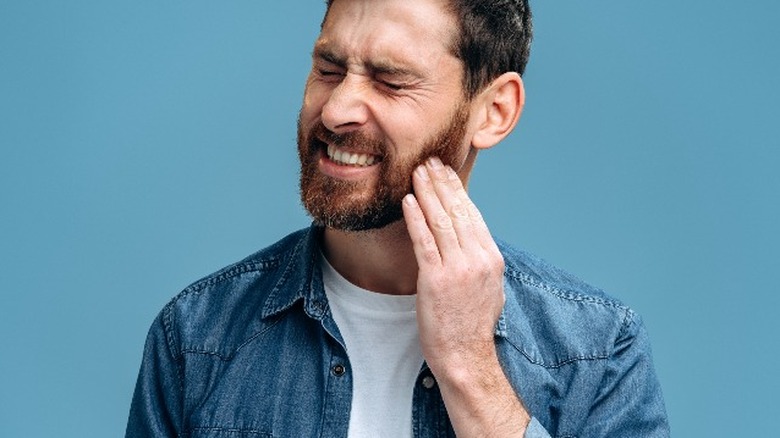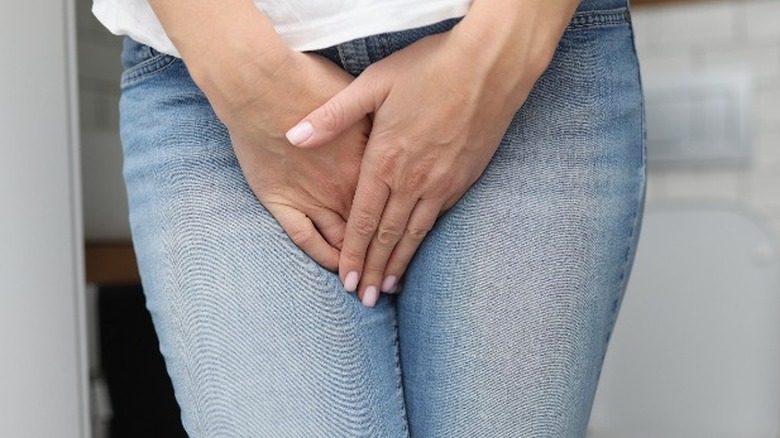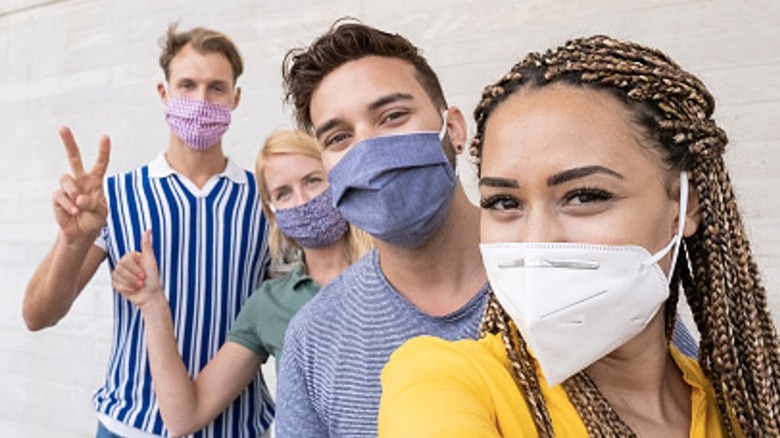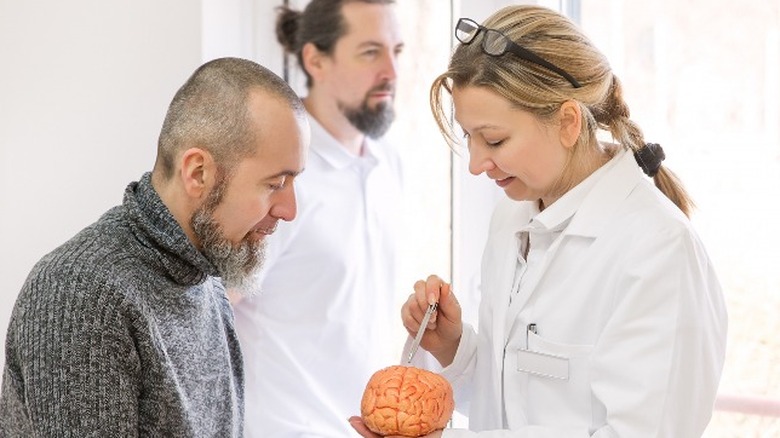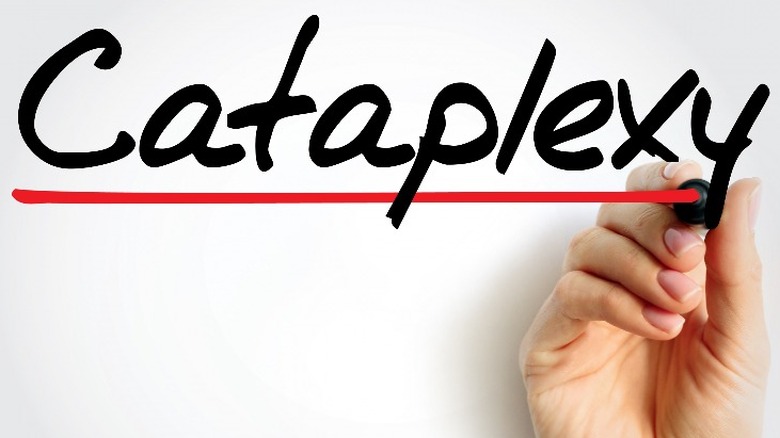Can Laughing Too Hard Be Dangerous For Your Health?
Laughter is an expression of joy and excitement that all humans share. Even from infancy, the ability to laugh is a major milestone in a baby's development and a sign of being able to communicate with others. As Dr. Robert R. Provine, the author of "Laughter: A Scientific Investigation," explained to WebMD, "Laughter is part of universal human vocabulary. There are thousands of languages, hundreds of thousands of dialects, but everyone speaks laughter in pretty much the same way."
It actually turns out that laughing is more than just a reaction to something funny. According to an article in Scientific American, the act of laughing may be tied to a primal need to create bonds with others or an evolutionary necessity to recognize when others are friends or strangers. Laughter also plays a major role in making social connections and creating shared experiences that define friendship.
With laughter being such an integral part of being human, is it possible that there are some negative effects? While there are several mental, emotional, and physical benefits to genuine laughter, some people may experience health risks when laughing too hard — particularly when there are underlying conditions that are affected by intense bouts of laughing. Here are some potential downsides to side-splitting laughter.
Asthma attack
Asthma is a type of chronic lung disease that affects the airways and how you're able to breathe. If you suffer from asthma and frequent attacks, you know how dangerous it can be. During asthma flare-ups, you may struggle with coughing, wheezing, and feeling more tired than usual. You're also at a higher risk of experiencing an asthma attack during a flare-up, which can cause sudden and life-threatening breathing issues, including shortness of breath, tightness in the chest, and severe coughing episodes.
Because an asthma attack can have serious consequences, it's vital that people with asthma understand what triggers their attacks and try to avoid them. For some, simple laughter can change breathing patterns enough to cause an asthma attack. According to Medical News Today, laughing can cause the diaphragm and chest to contract and tighten, which may put more strain on the lungs to inhale and exhale deeply. In other words, laughing too hard can start a domino effect that causes asthma symptoms to flare up and linger even after you stop.
Science Daily shared study results that found that 56% of asthma patients experienced laughter-induced asthma. However, it seems that fewer people suffer from asthma attacks from laughing when their asthma symptoms are well controlled. If you frequently struggle with attacks brought on by laughter, talk to your doctor about ways to get your asthma under control to avoid potentially dangerous effects.
Passing out
Another unfortunate result of laughing too hard for some people is feeling light-headed — and sometimes, even passing out. Referred to as laughter-induced syncope, it's possible to become dizzy and eventually lose consciousness after a bout of intense laughter, as explained in an article published by the Journal of Medical Case Reports. While research shows that this occurrence is rare, the case report also shares that it often goes unrecognized by healthcare professionals.
Another review found in Cardiology in Review shared that blacking out from laughter is likely related to Valsalva-induced syncope. If you're unfamiliar with that, a Valsalva maneuver is when you forcibly exhale while your airways are blocked, which results in a drop in blood pressure and a decreased heart rate (per Healthline). Although this technique can be beneficial if your heart happens to be beating too fast, the same reaction caused by a fit of laughter while your heart is beating normally can drop blood pressure enough to cause you to faint.
Even though unconsciousness from laughing will likely last for just a few seconds, it's important to know that suddenly passing out for any reason should be taken seriously. Talk to your doctor about the episode so you can rule out other serious issues.
Jaw dislocation and other jaw issues
Because laughing affects how you move your mouth and face, a powerful burst of laughter might also pose some risks to your jaw and temporomandibular joint. In fact, a Live Science article shared the story of a woman in China who managed to dislocate her jaw when laughing and required medical attention to stabilize and reset it.
The temporomandibular joint (TMJ) is what connects your jaw to your skull and allows the movements necessary for biting, chewing, and speaking. When too much pressure is suddenly applied to the TMJ, it can sometimes become unhinged and cause painful symptoms. Even after resetting the jaw and restoring function, it's possible that you'll experience lasting effects of temporomandibular joint disorder (TMB), including tension and a locked jaw. Dr. Sean Endsley of Legends Dental explains that "TMD is caused by stress and wear on the jaw joints, which can cause pain, stiffness, and loss of use if left untreated."
If you struggle with jaw issues, including frequent episodes of your jaw locking, unexplained pain in your ears or face, and stiff jaw muscles, it may be a good idea to avoid opening your mouth too wide when laughing. You may save yourself the pain and trouble of dislocating your jaw or aggravating your TMB symptoms. Also, talk to your dentist about possible treatments to help alleviate jaw discomfort.
Giggle incontinence
Hard laughter can make it difficult for some individuals to hold in their urine. As described in Urology Case Reports, giggle incontinence (GI) is a real condition in which people involuntarily lose control of their bladder when laughing or giggling. In the case discussed, the patient didn't just leak a few drops of urine during a bout of laughter. Starting at a young age, her bladder would actually empty completely whenever she laughed. Although there are other types of stress incontinence related to pressure put on the bladder when coughing or sneezing, the case report shows that GI is something completely different.
One review published in the Journal of Pediatric Urology found that there are two likely causes of giggle incontinence in children. One of the reasons leans toward a neurological explanation that is similar to cataplexy, which is a sudden decrease in muscle tone, weakness, or brief paralysis (via the Sleep Foundation). It's also possible that GI is linked to urologic dysfunction that causes the bladder to become weak. In any case, successful treatment of GI should take both of these potential causes into consideration.
Outside of giggle incontinence, many people do have stress urinary incontinence that is triggered by laughter. However, the cause of this type of incontinence is caused by weak pelvic floor muscles that allow urine leakage to happen. You can often strengthen pelvic floor muscles with Kegel exercises and other symptom-reducing treatments.
Abdominal and groin hernias
If you have an abdominal or groin hernia or are prone to developing hernias, laughing too hard can present some potential risks. Anything that increases pressure on the abdomen, including laughing, coughing, lifting weights, or straining during bowel movements, can aggravate weak areas in the abdominal muscles or tissue. A hernia occurs when a bulge develops and parts of your insides protrude from the body in one of those weak spots.
While hernias are usually not an immediate cause for concern, a ruptured hernia and strangulated hernia may be different stories. According to an article in the Indian Journal of Surgery, a hernia can spontaneously rupture and cause serious health issues if not treated immediately. Also, strangulated hernias, which are hernias that cut off the blood supply to the organs that are protruding from the weakened abdominal wall, are extremely dangerous. It can cause the tissue to die and become gangrenous (via Healthline).
Who is at risk of developing a hernia when laughing? As explained by Cleveland Clinic, people with higher risk factors of experiencing a hernia are those who are obese, have jobs that involve heavy lifting, suffer from chronic constipation, are pregnant or have had several pregnancies, or have a chronic cough or sneeze-inducing allergies. If you fall into one of these categories, it's important to pay attention to how much pressure you're putting on your abdominal muscles, including while laughing.
Headaches and migraines
Although there are several things that can cause recurring migraines or headaches, some people experience laughter-induced headaches after a good, hard chuckle. A case review published in the Journal of Neurology, Neurosurgery & Psychiatry described a patient who suffered from intense episodic headaches that were brought on only by genuine laughing. There did not appear to be any abnormalities in her brain, neck, or head that may have contributed to the headaches.
Headache: The Journal of Head and Face Pain, also published a review that looked into studies on laughter-induced headaches. There was some evidence suggesting that these types of headaches could be connected to intracranial disease and craniospinal pressure. However, other results showed a link between laughter headaches and headaches that were triggered by coughing or exercise. In most cases, the pain was experienced almost immediately after a bout of laughing and could not be reproduced by fake laughter.
If you experience severe headaches or migraines after vigorous laughter, it may be worth talking to your doctor about your symptoms. Your healthcare provider may have recommendations on how to manage the pain and what you can do to prevent the headaches from occurring.
Spreading of infectious diseases
With the effects of the recent pandemic still impacting the way many people live, it's safe to say that the general population has become more aware of how infectious diseases can spread. The Centers for Disease Control and Prevention (CDC) explains that infectious diseases happen when germs gain access to the body, multiply, and cause harmful reactions in the person. Infected people can then easily spread these germs when talking, coughing, sneezing, or other ways of transferring saliva or mucus droplets, including laughing.
Because laughing usually involves opening the mouth and deep inhales and exhales, viruses and bacteria can become airborne when a sick person laughs and is not wearing protective gear to prevent the infected droplets from spreading. Likewise, a person who is in close contact with a sick person may be more at risk of contracting an infectious disease if they are not careful about practicing preventative measures.
For those who are potentially sick, it's important to do everything you can to prevent the spread of disease to others, such as keeping your distance from people and covering your mouth when coughing, sneezing, or laughing. A mask can also help to stop airborne droplets from escaping your mouth and landing on others or high-touch surfaces.
Aneurysm rupture
For individuals who have aneurysms, changes in blood pressure can be incredibly risky. The American Stroke Association shares that both physical and emotional factors can trigger a dangerous rise in blood pressure that may cause an aneurysm to rupture or start to bleed. Something like lifting heavy objects can add pressure to the body and brain, making it more likely that an aneurysm will burst. However, waves of strong emotions can also result in raised blood pressure and an increased risk of an existing aneurysm rupturing.
If you're wondering how laughing ties into all this, Ronald L. Dalman, professor of surgery at Stanford University, shared with Gizmodo that "Hard laughing may increase blood pressure, which could precipitate rupture in an existing aneurysm if it was far enough advanced." He goes on to add, "Both ruptured aneurysms and acute dissections are extremely painful and frequently deadly. In that sense, neither are 'laughing matters.'"
An aneurysm rupture or hemorrhage is a serious medical condition that needs immediate attention. If you have an existing aneurysm, your doctor will share critical signs and symptoms that may indicate your aneurysm has ruptured. If you experience any of these symptoms, it's vital to get emergency care as soon as possible.
Choking or asphyxiation
When laughing, people tend to take deep breaths as their diaphragm and abdominal muscles tighten. According to the American Lung Association, laughter creates ideal conditions to fully expel stale air from the lungs, which allows more oxygen to enter the lungs. While that can be beneficial for your lung health, it may present a different kind of health risk: choking.
If you have something in your mouth while you're laughing, like food or gum, it can be all too easy to accidentally inhale that object and fully or partially block your airway. There's also the potential that whatever is making you laugh is distracting you from completely chewing your food or being careful when taking deep breaths.
As shared by Healthline, one way to prevent choking and asphyxiation is to minimize laughing or chatting during mealtime. You should also focus on chewing your food well and have water or other beverage with your meal to help wash the food down.
Cataplexy
Cataplexy occurs when the muscles in your body or specific parts of your body suddenly become weak or go limp in response to an intensely emotional experience. According to Healthline, bouts of crying, anger, and even laughter can trigger a cataplexy episode in some people. Symptoms may include feeling weak or paralyzed, losing control over parts of your face, unsteadiness on your feet, and eyes that appear half-closed.
There seems to be a connection between cataplexy and narcolepsy, which is a sleep disorder characterized by feeling drowsy or completely falling asleep during the day. As shared by Mayo Clinic, most people who suffer from type 1 narcolepsy also struggle with cataplexy, which is especially brought on by laughter. However, the majority of people who have type 2 narcolepsy do not experience cataplexy.
Although cataplexy brought on by laughing can be scary and concerning, there may be ways to reduce symptoms and experience episodes less often. Your doctor may recommend certain medications, including antidepressants, to improve cataplexy. It can also help to identify your triggers and talk about your condition with loved ones to ensure you have support when a cataplexy episode does happen.
Alkalosis
Alkalosis occurs when acids and bases in the bloodstream become unbalanced, usually due to not enough carbon dioxide in the blood. While respiratory alkalosis is often caused by a lack of oxygen and hyperventilation as a result of anxiety or a panic disorder, there are other things that can trigger this health issue.
A review published in Europe's Journal of Psychology found that laughter could actually cause mild alkalosis, which can affect the central nervous system. However, the effects do not appear to be as severe as alkalosis connected to panic attacks, stress, anxiety, and hyperventilation. Individuals who develop alkalosis from hyperventilation often experience symptoms like confusion, nausea, dizziness, and numbness in the face, hands, and feet (per WebMD).
The good news is that respiratory alkalosis is typically treatable and manageable. In most cases, the best course of treatment is to identify what is causing the hyperventilation and to focus on deep, restorative breathing. Cleveland Clinic adds that lifestyle changes, relaxation techniques, and medication can also help people who suffer from respiratory alkalosis.
A sign of neurological conditions
Although laughing may not be the actual cause of certain neurological conditions, inappropriate laughter may be a sign that something is not quite right with the way the brain is functioning. For example, unprovoked outbursts of laughter, inappropriately long laughing episodes, or other oddly-timed emotional responses could be a symptom of pseudobulbar affect or PBA (per Cleveland Clinic). People may develop PBA after suffering a brain injury or having amyotrophic lateral sclerosis (ALS) as an underlying condition.
Uncontrolled laughing may also be a symptom of gelastic seizures. According to the Epilepsy Foundation, gelastic seizures are characterized by giggling episodes brought on by focal or partial seizures in the brain's hypothalamus. People may also appear to be smirking or smiling during these laughing seizures, which they are unable to control or stop. Although individuals may appear to be happy or enjoying themselves while gelastic seizures are happening, it can actually be a frightening experience and cause social anxiety.
If you notice you or someone you know is laughing at inappropriate times or having laughter episodes that are not in response to anything funny, it's probably a good idea to talk to a healthcare professional about these symptoms. They may be easy to overlook because they involve laughing, which is not often associated with health issues.
Do the benefits of laughter outweigh the risks?
For most people, laughter is far more beneficial than it is harmful. Health hazards related to laughing are very rare, while the perks of laughing are universally recognized as ways to improve your health. As shared by HelpGuide.org, laughter has the ability to boost your mood, strengthen your immune system, reduce pain, relieve stress, and support emotional well-being. Finding humor in your everyday life can also help you build connections with others, stay focused, and let go of negative emotions you may feel toward other people.
In today's world, stress is a major issue that affects the majority of the American population. According to the American Psychological Association, around 76% of Americans suffered from a stress-related health issue in 2022, including headaches, fatigue, anxiety, and depression. Others reported that they felt overwhelmed, had trouble sleeping, were constantly worried, and were turning to drugs or alcohol as a way to cope. With concerning statistics like these, it's more important than ever to take advantage of natural ways to reduce stress, including regularly laughing with loved ones.
Health psychologist Dr. Grace Tworek told Cleveland Clinic, "Letting out a good laugh makes you feel more relaxed because it disarms your nervous system." She adds, "If you think about a moment when you were finding humor in life, it can be like nothing else mattered but that genuine joy that you were feeling."



